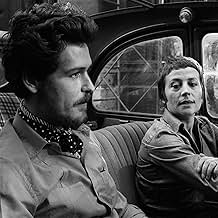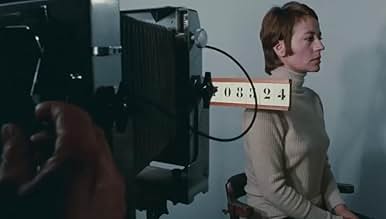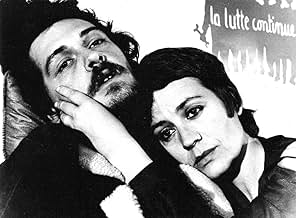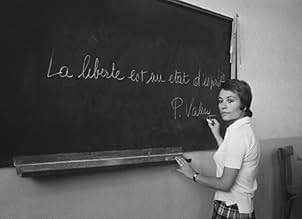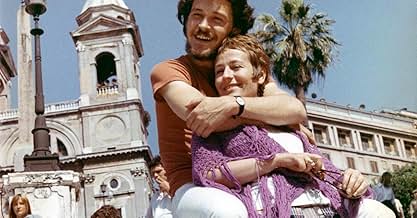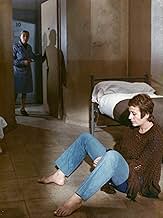Agrega una trama en tu idiomaRouen, France, 1968: Danièle is an unconventional French teacher. Every morning she takes her pupil Gérard to school. He flirts with her and she reciprocates his affection. This brings the p... Leer todoRouen, France, 1968: Danièle is an unconventional French teacher. Every morning she takes her pupil Gérard to school. He flirts with her and she reciprocates his affection. This brings the parents and the school authorities onto the scene.Rouen, France, 1968: Danièle is an unconventional French teacher. Every morning she takes her pupil Gérard to school. He flirts with her and she reciprocates his affection. This brings the parents and the school authorities onto the scene.
- Dirección
- Guionistas
- Elenco
- Premios
- 2 nominaciones en total
Marcelle Ranson-Hervé
- Madame Jaias - la voisine
- (as Marcelle Ranson)
Marianik Revillon
- Cécile
- (as Mariannik Revillon)
- Dirección
- Guionistas
- Todo el elenco y el equipo
- Producción, taquilla y más en IMDbPro
Opiniones destacadas
It is a so poignant, gripping movie, this film that can evoke SUMMER OF 43, but from another angle, told in a different manner. Here, the huge surprise is that it is question of a case of an embezzlement of a minor, involving a thirty-forty years old woman being in love with a young man; it is usually the contrary !!! I have never seen such a case before. The relationship between a mature woman and a young man under age. We can compare and analyze the differents and elements in common. Andre Cayatte was the best director for this tale, a social depiction of the 1968 France, the atmosphere, spirit, soul of this period that changed so many things in the world. Powerful performances that we can't deny. I am afraid that many people forgot this film. Such a shame. I guess that's the film that made Annie Girardot this so terrific for several generations. But a very sad story too.
N the 20th century - there were major events the World War 1, and World war 2 and the Black Movements of 1960s that gave Black people to travel in a bus and the most liberating of all was the GYPSY Trend - the Beatles, and everyone was getting liberated about SEX
Youth were breaking the barriers of social norms
There were - people smoking drugs and seeking salvation
Those were the times of Osho and Iskcon - Hare Rama Hare Krishna
In such times of 1960 - those are growing in that era - it must be really nostalgic
Compared that today's being FREE and LIBERATION is a big FARCE of fad and imitation
But in such times of 1960s - in France - when there was a movement to throw off the government through PROTESTS - where ideologies of Communism, Marxism and Maoist and emerging Capitalist clashed
A liberated modern liberated women Gabrille Rossier - a widower with twin 9 year old children, a Literature teacher and activist was motivating students and teaching them about REVOLUTION in France
One of her students was Christian - a 17 year old bearded lad - son of a rich, wealthy well known politician fascinated by the Militant Maoist movement of China.
Unlikely Christian fell in love with Gabrille, who rejected him many times, but in the end - seeing his passion fell in LOVE with him.
A very UNUSUAL LOVE Story
They secretly went to Italy for a tour together. When Christian's father came to know - he used all his political clout to publicly shame, debar, debase, dehumanize Gabrille as a witch monster who had seduced a minor - which was against the law.
A huge controversy erupted in the whole of France, Gabrielle was publicly prosecuted and it became a media trial - put behind bars - in prison. In protest Christiani ran away from home. When Gabriells was bailed out - they met again. There was a retrial. The boy being a minor was tracked down and forcibly put into mental asylum and Gabrille was again put behind bars. Even though they wrote letters to each other -and posted them - their letters never reached them. But through news Gabrielle came to know - how much Christian is suffering in the mental asylum while undergoing psychiatric treatment - shocks, injections to calm his anger down. When Gabrille was again released - To spare Christian from further trouble by his parents Gabrielle committed suicde.
It became a MASSIVE NATIONAL outrage of FREEDOM to LOVEz
There can not be any law that can bar two human beings from LOVING each other.
LOVERz were separated for practising FREE LOVE which was not permissible as per FRENCH law - only because boy's parents did not approve such UNUSUAL relationship.
The whole of France backed the couple and dead Gabriella
Mavis Gallant's who made movies on current social issues - made a movie on the same MOURIR D'AIMER It became the top most movie of France in 1971.
The humiliation a true LOVER suffers is brilliantly captured in this movie - the prison, the shame, the public outcry against her LOVERz should LOVE each other like this But not with a sad ending It is better - TO DIE FOR LOVEz I will go with 7.25 out of 10
Compared that today's being FREE and LIBERATION is a big FARCE of fad and imitation
But in such times of 1960s - in France - when there was a movement to throw off the government through PROTESTS - where ideologies of Communism, Marxism and Maoist and emerging Capitalist clashed
A liberated modern liberated women Gabrille Rossier - a widower with twin 9 year old children, a Literature teacher and activist was motivating students and teaching them about REVOLUTION in France
One of her students was Christian - a 17 year old bearded lad - son of a rich, wealthy well known politician fascinated by the Militant Maoist movement of China.
Unlikely Christian fell in love with Gabrille, who rejected him many times, but in the end - seeing his passion fell in LOVE with him.
A very UNUSUAL LOVE Story
They secretly went to Italy for a tour together. When Christian's father came to know - he used all his political clout to publicly shame, debar, debase, dehumanize Gabrille as a witch monster who had seduced a minor - which was against the law.
A huge controversy erupted in the whole of France, Gabrielle was publicly prosecuted and it became a media trial - put behind bars - in prison. In protest Christiani ran away from home. When Gabriells was bailed out - they met again. There was a retrial. The boy being a minor was tracked down and forcibly put into mental asylum and Gabrille was again put behind bars. Even though they wrote letters to each other -and posted them - their letters never reached them. But through news Gabrielle came to know - how much Christian is suffering in the mental asylum while undergoing psychiatric treatment - shocks, injections to calm his anger down. When Gabrille was again released - To spare Christian from further trouble by his parents Gabrielle committed suicde.
It became a MASSIVE NATIONAL outrage of FREEDOM to LOVEz
There can not be any law that can bar two human beings from LOVING each other.
LOVERz were separated for practising FREE LOVE which was not permissible as per FRENCH law - only because boy's parents did not approve such UNUSUAL relationship.
The whole of France backed the couple and dead Gabriella
Mavis Gallant's who made movies on current social issues - made a movie on the same MOURIR D'AIMER It became the top most movie of France in 1971.
The humiliation a true LOVER suffers is brilliantly captured in this movie - the prison, the shame, the public outcry against her LOVERz should LOVE each other like this But not with a sad ending It is better - TO DIE FOR LOVEz I will go with 7.25 out of 10
A forbiden love story between a Literature teacher and her minor student. And more. The film remains a manifesto about social perspectives , prejudices, image of the other, hypocrisy and Mai 1968. And, after ahalf of century, it is a realistic portrait o today.
Sure, being myself teacher, I am very subjective about theme. I admire the beautiful acting of Annie Girardot and wise way to explore his character of Bruno Pradal. An impressive story, a real case and way to influence the lives of other based by deep selfishness and large forms of hipocrisy.
Sure, being myself teacher, I am very subjective about theme. I admire the beautiful acting of Annie Girardot and wise way to explore his character of Bruno Pradal. An impressive story, a real case and way to influence the lives of other based by deep selfishness and large forms of hipocrisy.
The kind of role in which the talented, unique Annie Girardot was an expert. A film, like many others, that could not run on Romanian screens before 1989, but about which, like about many others, they wrote in the Cinema magazine led by Ecaterina Oproiu. That, in order to understand a little bit how perverse the communist regime was in that period in Romania, where I lived then: they banned a movie about a society that banned love. The film it's kind of a modern Romeo and Juliet, a little bit different. Made after a real event in France. One of the best roles played by Annie Girardot.
Note that a number of female American high school teachers have been sent to jail for what we are asked to view as a touching love story here. And in fact so many French viewers seem to regard it. For many American viewers, I think it will be hard, today, to view it with such equanamity, even if the (legally) victim here looks beyond his years (and apparently did in the real life case). But then I've met several girls from thirteen to fifteen who looked to be twenty - try making a film about a male teacher having an affair with one of THEM. Basically, if you want to understand why so many French intellectuals think Polanski's rape of a thirteen year old was no big deal, this film will give you some insight. Beyond that, it's a very dry style of filmmmaking, where the strongest passion on all sides seems to be anger. Supposedly these two can't keep away from each other, but there is zero sensuality in their interactions; they seem far more interested in talking about their persecuters than in each other's bodies (meanwhile, one lesbian scene makes it clear the filmmaker is not shy about naked bodies). It's also surprising to suddenly see the teacher concerned about losing custody of her children, whom we never see until late in the film and who don't seem in the least to concern her until legal stirrings raise the issue. When her ex-husband suddenly appears, it is downright jarring. Emotionally, the most powerful moments are with others, not between the two protaganists. Which is to say even if I didn't have moral reservations about the whole premise, I think I'd have trouble caring very much about the main character.
¿Sabías que…?
- TriviaContrary to popular belief, Aznavour's song is not in the soundtrack of the movie.
- ConexionesFeatured in Legendy mirovogo kino: Annie Girardot
Selecciones populares
Inicia sesión para calificar y agrega a la lista de videos para obtener recomendaciones personalizadas
Detalles
- Fecha de lanzamiento
- Países de origen
- Sitios oficiales
- Idioma
- También se conoce como
- Umreti od ljubavi
- Locaciones de filmación
- Rouen, Seine-Maritime, Francia(location)
- Productoras
- Ver más créditos de la compañía en IMDbPro
Contribuir a esta página
Sugiere una edición o agrega el contenido que falta

